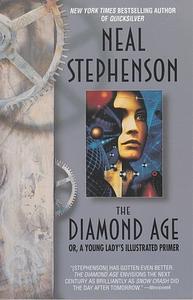You need to sign in or sign up before continuing.
Take a photo of a barcode or cover
Yup. A Neal Stephenson book. But possibly my least favorite of the three. Does this mean you get tired of his thing the more you read? Liked the world building, was fantastic in places. Couldn't work out any of the motives of the players. Apart from Nell's dad, he was fun.
This is a book about a new kind of book. Well, mostly anyway.
Mr. Stephenson set out to set a possible future by looking to the past; the Victorian Era England specifically. With dry wit hiding jokes in plain sight and chapter titles like Nell & Harv general living situation; the Leased Territories; Tequila, it calls to mind a Charles Dickens story. The inhabitants of the world, both organic (Confucian following Asians and folks acting like repressed Victorians) and artificial (nanomites that fight one another in the air leaving the air thick with “toner” and complete continents created from nanotechnology) are proof of a man with astounding creative capabilities. Then there’s that book.
The Primer is a book that teaches through interactive fairy tales. Through this, we get to follow Nell learn and grow. The lass’ situation is heartbreaking and her ability to not just escape into a world where the book has made her a princess but also learn how to survive in a world that presents a plethora of challenges for her. Through this subplot, we’re introduced to even more characters. All of them give us different glimpses of this world.
And what a world it was. The world at the beginning of the book is a vastly different one from the one at the end. The revolution that precipitates this change seemed to come out of nowhere. Save for a couple of scenes at the end, I found it to be rather pointless. Another aspect of the story that didn’t quite work for me was The Drummer’s Society. This group serves a pretty damn important role in the story but my not liking them detracted not one bit from my enjoyment of the story.
Good characters, solid world, dry humor, and the importance placed on a book makes this book a good read for me.
i really liked the cyberpunk parts but some of the fantasy bit was not my cup 'o tea so 4 stars. mater compilers though man ...
I have recently read Stephenson's previous book - Snow crash, and boy did it age badly. This is not the case with Diamond Age however. This novel dives into a kind of post-cyberpunk world where nanotechnology is omnipresent and in fact defines how people live in almost every aspect. From goods distribution to law enforcement, from judicial system to transportation and political organisation.
The first part of the story is an extensive info dump building the setting. To be honest it was probably my least favourite part as it was pretty dry and not engaging. Afterwards the story starts following the primer and its 3 main users. Although theoretically the book is about that primer and the great majority of the plot is connected to it, I saw it is a mere excuse to venture into topics like self-determination, state as a convoluted oppressive system, etc. All of it is mixed with quite a lot of techno-babble and actually pretty well done. I enjoyed how the author envisions social and political repercussions of technology. And these topics I see as definitely the strongest points of the book. The plot itself isn't bad, but nothing extraordinary either. Especially the way we approach the end is disappointing. After reading this one I am excited to grab another of Stephenson's books and dive into the world of his crazy ideas.
The first part of the story is an extensive info dump building the setting. To be honest it was probably my least favourite part as it was pretty dry and not engaging. Afterwards the story starts following the primer and its 3 main users. Although theoretically the book is about that primer and the great majority of the plot is connected to it, I saw it is a mere excuse to venture into topics like self-determination, state as a convoluted oppressive system, etc. All of it is mixed with quite a lot of techno-babble and actually pretty well done. I enjoyed how the author envisions social and political repercussions of technology. And these topics I see as definitely the strongest points of the book. The plot itself isn't bad, but nothing extraordinary either. Especially the way we approach the end is disappointing. After reading this one I am excited to grab another of Stephenson's books and dive into the world of his crazy ideas.
Elements of this book have combined w/other things to give me nightmares. Otherwise fun to read, mostly?
This is sort of like a spiritual successor to Snowcrash. It moves from cyberpunk into a more nano-technology centered society, but still maintains all of the values of classic cyberpunk.
Not only is the story compelling and well written, but it explores a number of interesting topics, such as organic computing, introduction into a hive-mind mentality, the power of education, etc...
Not only is the story compelling and well written, but it explores a number of interesting topics, such as organic computing, introduction into a hive-mind mentality, the power of education, etc...
adventurous
slow-paced
Plot or Character Driven:
Plot
Strong character development:
Complicated
Loveable characters:
No
Diverse cast of characters:
No
REALLY interesting sci fi - the world is incredibly built and presented. I didn't know what was going on half the time, but that was okay. A really interesting perspective on a potential post-scarcity society: that maybe resources could be available for all, but the rich would still control them.
adventurous
dark
hopeful
informative
reflective
medium-paced
Plot or Character Driven:
A mix
Strong character development:
Yes
Loveable characters:
Complicated
Diverse cast of characters:
Yes
Flaws of characters a main focus:
Yes
I think I did Neal Stephenson a great disservice by reading Fall or Dodge in Hell before any of his other books. That book was a huge letdown for me in part because I found the premise was so interesting and the back-half of the 700 plus page story morphed into a basic and uninspiring retelling of the bible. I felt so burned I had to be talked into reading "The Diamond Age" but I'm very glad I did. I finally understand the Neal Stephenson hype.
The world in this book feels alive in a way you wish all stories felt; in some parts I could imagine I was walking down the streets of a fully-realized futuristic Hong Kong. Similar to Fall or Dodge, there is a fantasy story within the main sci fi story, but coming from a young protagonist the effect is less tedious and more whimsical. There is a specificity and a playfulness to the way the nanotechnology is explained that makes it a joy to read. It's hard science fiction at it's best, replete with ideas about technology, artificial intelligence and the democratization of knowledge. It's oddly prescient for a book published in 1995 considering there are allusions to what are basically ipads, the rise of a gig economy and crypto currency. The plotlines involving a society of abandoned Chinese girls becomes very interesting in a modern light considering we are still today unpacking the ramifications of China's one child policy.
Not every twist and turn in the plot works for me 100% and the ending feels a little insufficient, but the book is smart and zany enough to win me over.
The world in this book feels alive in a way you wish all stories felt; in some parts I could imagine I was walking down the streets of a fully-realized futuristic Hong Kong. Similar to Fall or Dodge, there is a fantasy story within the main sci fi story, but coming from a young protagonist the effect is less tedious and more whimsical. There is a specificity and a playfulness to the way the nanotechnology is explained that makes it a joy to read. It's hard science fiction at it's best, replete with ideas about technology, artificial intelligence and the democratization of knowledge. It's oddly prescient for a book published in 1995 considering there are allusions to what are basically ipads, the rise of a gig economy and crypto currency. The plotlines involving a society of abandoned Chinese girls becomes very interesting in a modern light considering we are still today unpacking the ramifications of China's one child policy.
Not every twist and turn in the plot works for me 100% and the ending feels a little insufficient, but the book is smart and zany enough to win me over.
I like to think of Stephenson's work as the succesor to cyberpunk. It has a lot of the grimey-future aspect of cyberpunk, but with more optimism, humor, and nuance. Good stuff.







